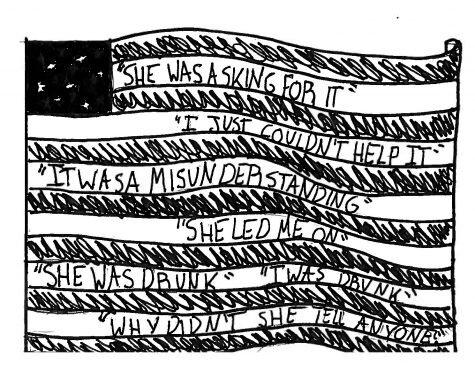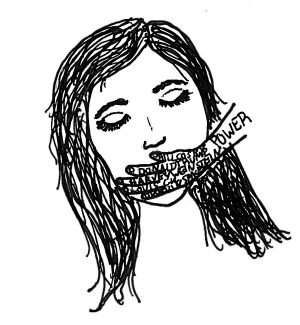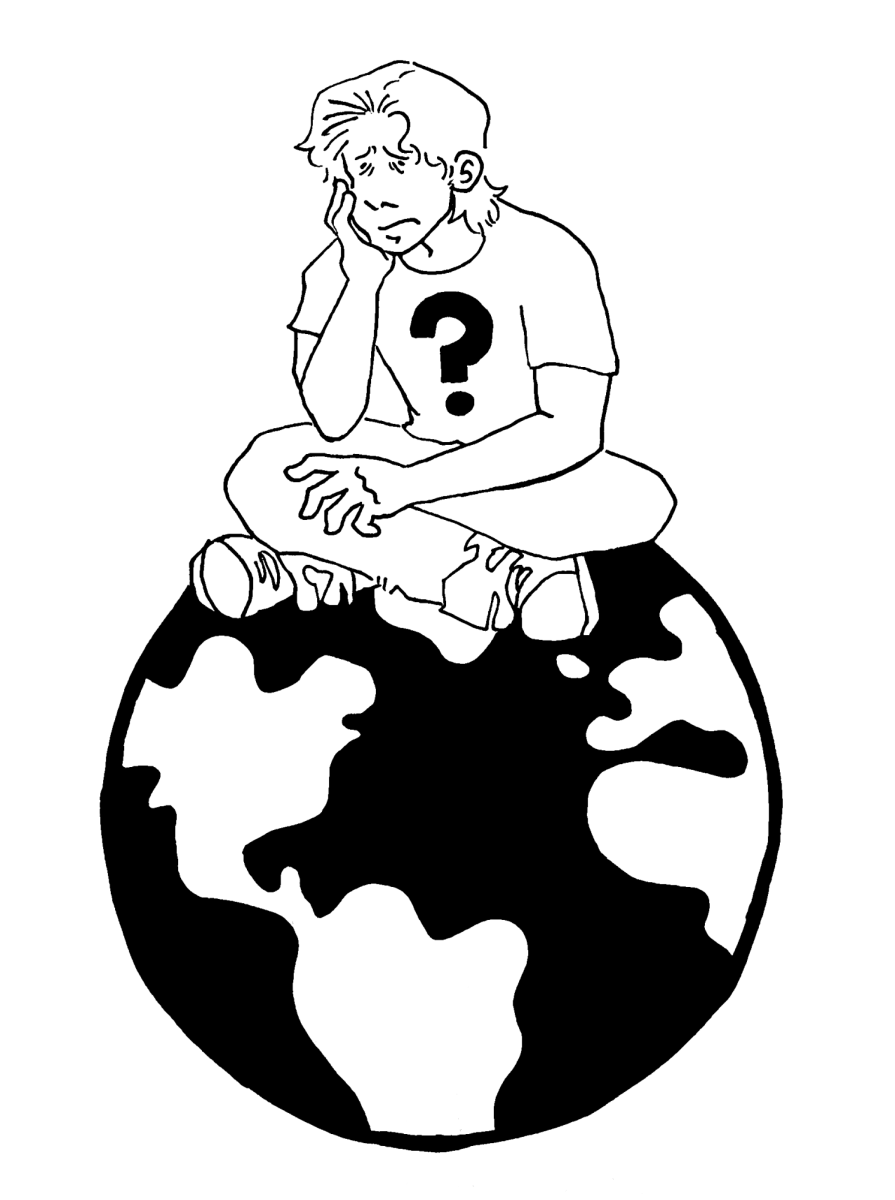Recent allegations against public figures raise questions about sexual assault
Eileen MacDonald, Staff Reporter
Originally published November 30, 2017
All it takes is 98 seconds.
The time it takes to listen to a song; the time it takes to watch a funny YouTube video, the time between a ‘no’ and a forced ‘yes.’
Every 98 seconds, someone somewhere is sexually assaulted, and it needs to stop before the clock runs out.
In recent months, sexual assault accusations towards Miramax founder and former studio executive Harvey Weinstein have been surfacing from over 80 women, young and old. He who was once the most powerful man in Hollywood has finally been held “accountable” for his actions.
Except he hasn’t really. He has been displaying such behavior since the 80s, and our society has continued to turn a blind eye to it until now, when it is unavoidable to face it.
Meghan Thomas is the Communications Specialist for the National Sexual Violence Resource Center (NSVRC). “The Weinstein allegations show that Hollywood and the media are no different from other workplaces, and that although the ‘office’ might be a film set or an audition, sexual harassment and sexual assault can still happen,” said Thomas in an e-mail response. “The fact that Weinstein’s misconduct went on for so long says a lot about the widespread nature of sexual harassment and abuse and shows that, for a long time, people felt discouraged from coming forward.”
This isn’t an isolated case. Wealthy and famous men across the country such as comedian and actor Bill Cosby, Oscar winning actor Casey Affleck, and more recently, movie producer and director Brett Ratner, actor Kevin Spacey, and comedian Louis C.K. have similar allegations against them that have been ignored for years.
What makes men like Weinstein any better? What makes them more worthy of forgiveness? Power.
These men are public figures, with enough authority and money to gloss over their wrong-doings. Victims do not feel safe to speak up because the moment they do, their careers could end. Men like Weinstein have far too much control over others, and thus they feel they can do whatever they want to whoever they want. As a result, people like the many women Weinstein attacked are scarred for life.
“[People in power] may see sexual assault as a way to enforce their power on those who are vulnerable,” Thomas said. “In fact, people who commit sexual violence often abuse their authority status. As a society, we must hold those who sexually abuse accountable, regardless of their position in the community, power, fame, or wealth.”
Weinstein’s behavior towards women perpetuates the idea that rape and assault are excusable; an idea that continues to be enforced not only by Weinstein but also by other male authority figures including our current president.
Chelsea Clark is the Mental Health Counselor for the on campus Teen Health Center. “It speaks to that whole ‘boys will be boys’ mentality,” Clark said. Our societies reaction to sexual violence has set a standard for living and normalized an unhealthy rape culture. By electing a man who himself has been accused of sexual violence and misconduct, and on top of that has been known to brag about it, we have broadcast to all the young boys in the nation that they can get away with such things; that there won’t be consequences and it won’t hurt people.
But this isn’t truly a political issue. It is an issue of basic human rights, of civility, of decency, of respect, and of passivity.
According to the National Sexual Violence Resource Center (NSVRC), nearly 70 percent of people who have been subjected to harassment in the workplace never reported it to a manager or superior. In addition, 75 percent of employees who did speak out about their harassment were met with some form of retribution or with a dismissive, often hostile response that trivialized the issue.
“Predatory behavior thrives on the silence and inaction of those who know about it,” Thomas said. “People, particularly other men, who knew about Weinstein’s behavior and thought of it as ‘not my problem’ or a ‘private matter’ allowed these abuses to continue. Many women in the industry have spoken about ‘whisper networks,’which are informal networks of communication warning other women about particular people who may be abusive.”
Ignoring the plight of a victim of sexual violence is not the same thing as protecting their privacy. If anything, the lack of reaction places them at a greater risk and will make them feel more alone than they already do. If you are in a position to make a difference, then say something, or at least reach out with validation for those affected.
“People are really isolated, so pulling in supports is really important in their mental health treatment, because they blame themselves—pulling in people who are actually going to believe them and not blame them,” Clark said.
We cannot allow this issue to be brushed aside as it so often is. Now, more than ever, it is essential to start a dialogue and erase the stigma that surrounds the victims of sexual assault; because while Harvey Weinstein and those like him are the most apparent cases sexual assault and manipulation, these cases are all around us; in workplaces, in homes and even in our classrooms.
“I’ve talked to a lot of students who feel that [sexual harassment] is part of the culture,” Clark said. “They get heckled in the halls, they don’t feel comfortable, they walk a different route to class because there are groups of guys who make comments on their bodies, and you know I think that’s something that we could do a lot of work on here.”
Regardless of where you live, whether it is a “liberal bubble” or a conservative small town, sexual violence is an issue, and you are surrounded by victims.
According to Karen Boudour, a nurse practitioner for the Teen Health Center, sexual harassment is a common occurrence on campus. “We actually ask on our adolescent questionnaire for any new patient who comes in whether they’ve ever been coerced into sex or whether they’ve ever been raped,” Boudour said. “I would say we get a positive at least weekly.”
Over 25 students at our school are raped or assaulted every school year, and that is only addressing those that have been reported. Those numbers need to change and we can’t just wait for it to happen.
“Everyone has an opportunity to speak up and challenge problematic and disrespectful behavior—we call this bystander intervention,” Thomas said. “Bystander intervention can mean stepping in and stopping sexual harassment when you see it happening, but it can also mean speaking up when you hear people using sexist language or telling rape jokes.”
Women such as Clark and Boudour are mandated reporters. This means that if you yourself or a friend has had an experience with sexual assault or harassment, they will be there for you and walk you through the reporting process. It is hard to speak up, but so important, because if nothing else, your voice will keep other potential victims safe.
April is Sexual Assault Awareness Month, and provides opportunities for students to hold events so that they can inform their peers about sexual violence. While this is a chance worth taking advantage of, there are plenty of ways to inform yourself and those around you at all times of the year.
The NSVRC is one of many resource centers dedicated to providing information and support for victims of sexual violence. If you think that you or someone you know has been assaulted, there is always someone there for you, whether they are a phone call away, or across the Commons in the Teen Health Center.
“I would tell [victims of sexual assault] that what happened to them was not their fault, and that their feelings and experiences are valid,” Thomas said. “I would also tell them I hope they could find the support they need, in whatever form that takes for them.”


























